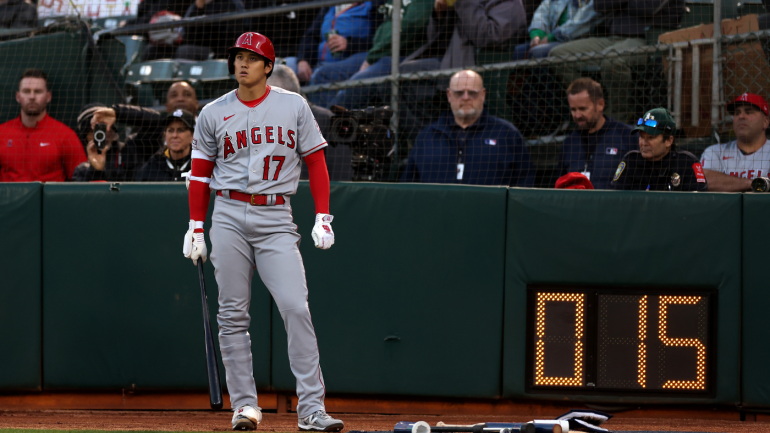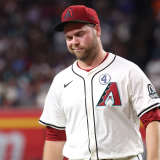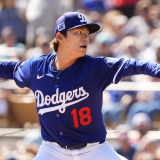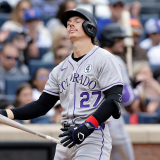
We're now just about a week and a half into the 2023 Major League Baseball season. Heading in, one of the biggest storylines was how the new rules would play. They were relatively radical changes, at least the big three:
- Pitch clock
- Bigger bases
- Defensive shifting limits
We've gone over the rationale for the rules many times, but the basic bottom line was striving toward a more exciting product. More specifically, less dead time, quicker-flowing games, more singles and more baserunning chances (which includes stolen bases).
So far, so good for me and I have no doubt the league office agrees. We've seen 4.69 runs scored per team per game this season, up from 4.28 in 2022. Singles are up to 5.45 per team, per game; it was as low as 5.06 in 2020 and this is the highest rate since 2017. Batting average is up to .249, the highest it has been since 2019.
The stolen base rate is way up to 0.70 per team, per game. It was 0.51 last year and 0.46 in 2021. This is the highest stolen base rate since it was also 0.70 in 1999. The last time it was higher than that was 1997.
The big one, of course, would be the average time of a game. As of Monday, that average sits two hours and 39 minutes. I should call it a tidy 2:39 after what we've gotten used to for the past several decades. The average game time in MLB hasn't been below two hours and 40 minutes since 1984.
Now, I've tried to discuss this with a segment of die-hard baseball fans for years when the argument inevitably comes up. You, die-hard baseball fan, were never the issue. You were going to watch no matter what. It's the casual sports fans or even people who haven't ever been baseball fans before at issue. What we've long needed in order to hold onto people switching through channels or even being dragged to a game in person is more action and less down time.
The playoffs are especially important on this front. Playoff games in recent years have been ending far too late. What's the point of getting into a new sport or digging in deeper than casual fandom if you're going to have to go to bed before the game ends?
This is why I'm already swatting away the people who believe the pitch clock -- like the extra-inning, runner-on-second rule -- should go away in the playoffs.
First up, after 162 games of a certain pace, I really don't think we should be in the business of totally changing how every single pitch operates. That changes the entire complexion of the game. Secondly, we still have to be concerned with drawing a larger audience than just the die-hards who would stay up all night to finish a game regardless.
There were several different ways to spin the playoff ratings last season as a positive for baseball, but it was still the second-lowest rated World Series ever, behind 2020. Some circumstances can't be helped and we'll never return to playoff and World Series ratings from multiple decades ago, but quicker and more exciting games can increase the viewership, too. Late finish times really hurt, in my view.
Prior to the World Series last season, the playoff games were averaging three hours and 21 minutes. Here are the end times with length of the 2022 World Series game in parentheses.
Game 1 - 12:37 a.m. ET (four hours and 34 minutes; 10 innings)
Game 2 - 11:21 p.m. ET (three hours, 18 minutes)
Game 3 - 11:11 p.m. ET (three hours, eight minutes)
Game 4 - 11:28 p.m. ET (three hours, 25 minutes)
Game 5 - Midnight ET (three hours, 57 minutes)
Game 6 - 11:16 p.m. ET (three hours, 13 minutes)
We already lost probably every single casual fan in the Eastern and Central time zones in Game 1. Game 5 is off the table for Eastern and pretty dicey for Central. I do think if fans are hooked into a close game, they'll expand their usual bed time, but only by so long. You aren't keeping new or casual fans an hour past shuteye. That just won't happen. And, really, it's feasible that the overwhelming majority of casual baseball fans in the Eastern time zone would have given up on all six games, or at least the ones that fell on a work night.
Let's also keep kids in mind. We're trying to hook the next generation of consumers, right? Otherwise the game dies. How many kids are staying up this late on a school night?
I've seen some in the past float earlier start times, maybe even up to 7:00 p.m. ET, but that is 4 o'clock on the west coast and that's punishing them while also possibly missing out on grabbing some casual fans. The 8-8:15 range being 5-5:15 in the West seems to be the sweet spot. We just needed faster games.
Now, the pace of play would obviously remain similar in the playoffs to the regular season, but the time of game would increase by virtue of longer commercial breaks. Commercials in the regular season are two minutes and five seconds. In the playoffs, it goes up to two minutes and 55 seconds. Yeah, it's annoying and it would be nice to cut it down, but the league isn't turning down the extra commercial revenue. Some things in life are necessary evils.
I do not count a pitcher standing on the mound for as long as he wants or a hitter messing around with his batting gloves for 30-plus seconds as necessary evils. They never have been and never will be.
On average, MLB games this season have cut 27 minutes from regular-season games. Let's say the playoffs are similar. Go back up to the World Series times listed above and chop 27 minutes off. That's pretty workable for every time zone, right?
It's only been a small sample, obviously, but the new rules have passed every test with flying colors, as far as I'm concerned. Hopefully more and more people notice as the season progresses and the playoffs get more eyeballs than in recent years.
![[object Object] Logo](https://sportshub.cbsistatic.com/i/2020/04/22/e9ceb731-8b3f-4c60-98fe-090ab66a2997/screen-shot-2020-04-22-at-11-04-56-am.png)


















